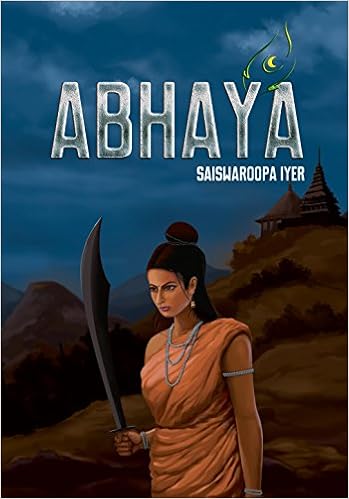This post is simply a description of my personal experiences reading 'Abhaya', Saiswaroopa Iyer's first novel, which I've quickly penned down in no particular order.
I got the Kindle edition at Amazon.com, and began to read immediately, and did not put it down, finishing the novel in one go. From a Rasika's perspective, the characters in the book and the situations cover all nine Rasas. We'll look at just two examples here: the Hasya of Krishna's predicament reminded me just a bit of Kapil Sharma's comical situation in the movie 'Kis Kis to Pyar Karoon'. And the Veera Rasa the reader experiences when we read about Princess Abhaya's courage as she fights against all odds for the cause of Bharatavarsha is a highlight. I'm sure readers who are keyed into social media will want to know about the 'Swachch Bharat' lady of Varanasi in the novel. Read and find out!
Some of the pages, along with the vivid descriptions, appear to leap right out of old Amar Chitra Katha and Chandamama stories that we all loved to read and re-read before the advent of 24-7 TV. The Shringara Rasa is also on view, some of which I'd personally rate as 'U/A', making the content suitable for young adults. There are excellent and lucid discussions centered on dharma and duty which are suitable and perfect for any age. The dilemmas and challenges that Abhaya and other characters face, and the dharma ethics that is evident in the subsequent decisions they take was brilliant to read.
Saiswaroopa employs several Sanskrit non-translatables, and the author must be commended for this. This is a daunting task, and the author's Shraddha in the sensitive but frank handling of native Indian traditions is evident. There is little or no spoon-feeding of poor approximations of key Sanskrit terms in order to cater to the westernized reader. For example, the meaning of 'dharma' is contextual, and is used as is, and is not mistranslated as 'religion' etc. Also the accurate term 'Arya' is used in the novel, although the dreaded 'Aryan' did appear once, perhaps inadvertently. Hope this gets fixed in the next cycle of edits. There is some emphasis on 'faith' toward the end, which caused me some confusion. I personally chose to interpret 'faith' as 'Bhakti derived from a deep Anubhava' rather than as a dogmatic belief in a purely external force that is highly unlikely to bear fruit no matter how long, and how much 'hope' and 'faith' one has. On the other hand, the dharmic discussions toward the end were both moving and riveting. Yes, this is a work of fiction, but it also full of truth.
Despite being a fictional novel, it is quite clear and impressive that the author has taken pains to ensure an accurate portrayal of dharma traditions. And to be able to do so honestly, and without compromising on the readability and the smooth progress of a fairly intricate plot surely requires a high degree of skill, and fearlessness. This is a lesson, and a benchmark for every budding Indian writer. How many times have we have seen Indian and Western authors compose grandiose works and dramatizations set in a dharmic context, but approach the work purely intellectually and without the requisite Shraddha or Anubhava. They write from a "outsider" perspective, and without any adhyatmic insight, inevitably end up mangling dharmic concepts and the deep civilizational ideas. In direct contrast, this author's writing appears to be grounded in her dharma, and for me, this is the fundamental reason for the success of this work.
Finally, some brief notes on the writing style and some memorable characters. The first thing that came to mind when Krishna enters the story is Sri SL Bhyrappa's epic 'Parva'. Abhaya's Krishna will be loved by everybody. Full of wit, compassion, courage, mischief, love, understanding, and wisdom. Abhaya's lead character is smart, resourceful, cool, beautiful, and thoughtful. The quintessential Indian woman. There were some places where the turn of phrase employed pleased the Ganitha/analytics professional in me. Cool! The author seems to have a natural story telling ability, and she does so with a brisk and clear style. I'm quite convinced this is the first of many books we will get to read and enjoy.
Abhaya is an authentic Indian work that has something positive for everybody. Those who have grown up reading stories from Indian Itihasa will be able to relate to this book. I highly recommend it.

No comments:
Post a Comment